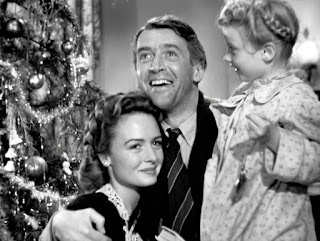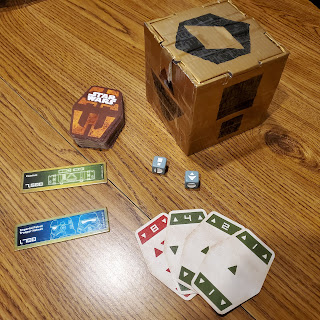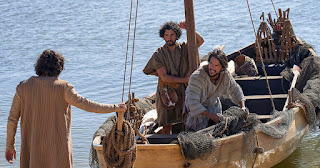Christmas: The Eucatastrophe of Human History
You might recall from my Lord of the Rings post last month that I really like a literary device Tolkien uses, which he calls "eucatastrophe." I'd like to use this post to explore that concept a bit more, and tie it together with the meaning of Christmas.
In case you don't remember what eucatastrophe means, or I didn't explain it well enough, I'll let J.R.R. Tolkien himself break it down for us. In the essay "On Fairy Stories," Tolkien defined eucatastrophe as "the sudden joyous turn" in a story. It is "a sudden and miraculous grace, never to be counted on to recur."
We can look at Tolkien's own works for an example. In The Return of the King, at the Battle of Pelennor Fields, things are not going well for the Riders of Rohan and the defenders of Minas Tirith. Although they had defeated the Witch-King, they were no match for the remainder of Sauron's forces. Defeat seems certain, especially when they see black sails coming up the River Anduin. The Corsairs of Umbar have arrived, bringing further reinforcements for the enemy. However, we then learn that the ships are not manned by the corsairs, but by Aragorn, Legolas, Gimli, the Dunedain Rangers, and a host of soldiers from Gondor's coastal cities. Victory is now within our heroes' grasp.
To Tolkien, eucastastrophe is not just an easy out. It does not mean that the characters in a story were never in any danger. On the contrary, the possibility of everything ending in sorrow is what makes the turn in the story so wonderful. He wrote in a letter to his son Christopher that eucatastrophe "pierces you with a joy that brings tears."
It occurred to me recently that my favorite Christmas movie ever, It's a Wonderful Life, has a eucatastrophic ending. George Bailey has sacrificed so much, for so long, to help others. At the center of that is the Bailey Building & Loan. It represents all the ways he's helped others, and everything he's given up - his plans to travel the world and go to college, to leave his home town, his honeymoon. And all of that is threatened when Uncle Billy loses the bank deposit. George feels he has nothing left to live for, and is going to throw away his life. An angel named Clarence shows George why that would be a mistake, and how valuable George's life is. But the scene that brings me to tears is at the end of the movie, when everyone in Bedford Falls rallies around George to get him out of trouble, culminating with Harry's toast: "To my big brother George, the richest man in town."
In case you're wondering, the connection to Christmas is more than just the fact that there is a Christmas movie which employs eucatastrophe in its story-telling. In fact, Tolkien considers the whole point of Christmas - the Birth of Christ - to be the eucatastrophe of the story of humanity. Things were at their darkest. Man had separated himself from God through sin. God's people had continually broken their covenants with Him, and their nation had been through the works - corrupt kings, exile, and occupation by foreign powers. But then God Himself took on human nature, to save His people from their sins and make it possible for them to attain eternal happiness in heaven.
I think that speaks to why eucatastrophe affects us the way it does when we come across it in fictional stories. As Tolkien writes to his son, "it is a sudden glimpse of Truth, your whole nature chained in material cause and effect, the chain of death, feels a sudden relief as if a major limb out of joint had suddenly snapped back." We see, in the happy endings of these stories, the way things are supposed to be. Not because we deserve it, but because God is the Author of the story we live in. The joy we experience brings us to tears "because it is qualitatively so like sorrow, because it comes from those places where Joy and Sorrow are at one, reconciled, as selfishness and altruism are lost in Love."
Of course, Christ's eucatastrophic intervention into human history isn't just something that happened 2000 years ago. Christmas isn't just some memorial of a distant historical event, an excuse to get together with family members, share a meal, and exchange gifts. (Not that any of those things are bad.) The whole point of the liturgical year - in which we celebrate different Gospel events throughout the year - is that it guides our own spiritual journey. So with that in mind, Christmas should have a personal meaning. It should be about Christ coming into our lives today.
Through the sacraments, we have the opportunity to encounter Christ on a personal level. The Sacrament of Reconciliation in particular is an instance when God saves us from our sins. It is a beautiful and poignant moment, when, in the midst of recounting and reflecting on the many ways we have failed God and succumbed to sin, Christ - through the person of the priest - offers us forgiveness, and wipes our souls clean.
So this Christmas, enjoy the presents, enjoy the meal, enjoy your time with your family and friends. But also invite Jesus into your life more fully. Allow Him to turn your life around, to save you from sin, and bring you towards a happy ending that's better than anything you can read in a book, or watch in a movie.
Merry Christmas!
Catholic Pick: Catholic in a Small Town Podcast
Catholic in a Small Town is a podcast about a Catholic couple - Mac and Katherine Barron - raising kids and living out their faith in a small, south Georgia town. They talk about the goings on in their family and in their town, the movies and TV shows they are watching, and how they strive to live out their Catholic faith. I've been listening to this show for years, and it's always entertaining. Mac and Katherine bring humor, charm, and sincerity to this almost-weekly show.
This is one of my favorite Catholic podcasts. Also, if you listen to Adventures in Imperfect Living and Just a Catholic Dad, the hosts are all friends, so you'll hear them referenced (or leaving feedback) on each other's shows. Kind of like how the Hulk might show up in a Thor movie, or how the Flash might show up on Arrow. That's right - Mac and Katherine are podcasting superheroes.
You can download episodes by searching for Catholic in a Small Town on iTunes or your podcast catcher of choice, and find out more at their website, here.
Thanks for reading! If you like my blog, and you'd like to receive emails each time I upload a new post, you can enter your email address below. Or, you can "Like" or "Follow" GCD's Facebook page here. If you want to express an opinion, ask a question, or give feedback about this post or others, feel free to leave a comment below, or email me at geekycatholicdad@gmail.com.
I am a participant in the Amazon Services LLC Associates Program, an affiliate advertising program designed to provide a means for sites to earn advertising fees by advertising and linking to Amazon.com. This means my reviews, GCD Picks, and some other posts include links to Amazon in case you want to buy the product after reading my review. If you do make a purchase via my affiliate link, I'll get a few cents.
So if you would like to send a few pennies my way (which I use to pay for hosting the site), you can use my Amazon links to purchase any of the items I have recommended, or anything at all from Amazon. Alternatively, you can click the Amazon link here, and then proceed with your Amazon shopping.




Comments
Post a Comment